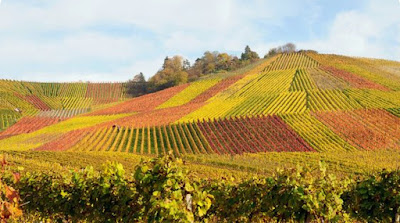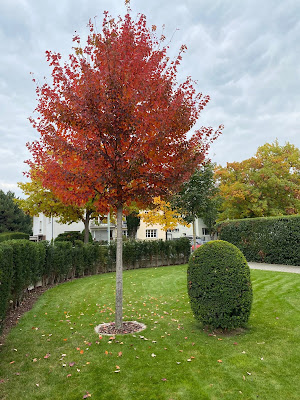Fall in Germany
Beautiful Fall Colors
As we travel hundreds of miles each day visiting missionaries, wards and branches we are enjoying the gorgeous fall colors of Germany. You can see every shade of orange, gold, lime green, purple and burgundy along the roadways. There are many vineyards in the area and the vines of each type of grape are all different colors. It is gorgeous.
Germans and Fresh Air
We were in church last Sunday. The temperatures outside were in the 50's and they threw open the doors. I chilly draft blew through and Dan and I about froze to death during the hour long meeting. In another church building we saw this pile of blankets the ward had purchased for members to use during meetings. Below is the explanation of the German way of thinking on fresh air:
If you're in an office, cafe, bar or restaurant, look around you. Are the windows or doors wide open? If so, it's likely because of a very German habit: Lüften or airing out a room. "The custom is something of a national obsession, with many Germans habitually opening windows twice a day, even in winter. Often the requirement is included as a legally binding clause in rental agreements, mainly to protect against mold and bad smells"
Proving how seriously Germans take airing out rooms there are different methods for ventilating. Stoßlüften literally translates to “shock ventilation" or "impact ventilation". For about five minutes at least twice a day (usually in the morning and evening), it involves opening the windows wide and let a 'shock' cold air stream in. Then you close the windows and the room is fresh again.
It doesn't matter what time of year it is – even if it's winter and it's freezing outside this will still happen.
There's also Querlüften, or cross ventilation, which involves opening all the windows of a house or building and letting the fresh air flow through.
It's common practice for Germans to turn off all of the heating, and to don a hefty jacket before they let the bitterly cold air in.
A Heat-less Home
We finally have heat and hot water!
In Germany water is heated by some type of furnace. This is also used to heat the house in the winter by running the heated water through individual radiators in each room of the house. Two weeks ago we started noticing that these radiators were cold in the morning and the first person in the shower had hot water but the second person only had warm water if they were lucky. We were told to press the reset button which would help for a few hours but then it would go out again. Day after day repairmen were sent but nothing seemed to change. Cold sponge baths are not fun! Finally when we arrived home from interviews in Nürnberg, the heat and hot water was on. Hooray! You know, it's the little things in life...
"When you go to a restaurant in Germany, a waiter will NOT bring you a complimentary glass of water. In fact, it’s almost impossible to get a glass of tap water in a German restaurant even if you ask for it.
Now the tap water in Germany is generally safe to drink — but Germans usually don’t drink it, and the restaurants definitely won’t serve you a free glass of German water. The only water you can get it a restaurant will be bottled water with carbonation or bottled water without carbonation.
"So what’s the reason why no-one drinks tap water in Germany when it’s perfectly safe to do so?
The reason is at least in part the word for tap water. the German word for tap water is Leitungswasser which literally means plumbing water. Now if you offered someone plumbing water, well that’s slightly better than sewer water but it isn’t something you would do."
So when I go to a restaurant, I order "stille wasser" or still water. They bring out a little tiny bottle which I try to ration as I eat my meal. We have noticed that Germans drink very few fluids during a meal or during the day. Not sure why they are not dehydrated!









Comments
Post a Comment